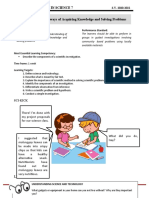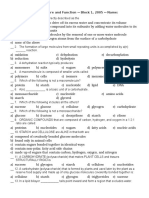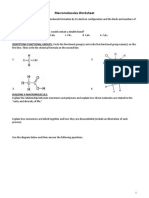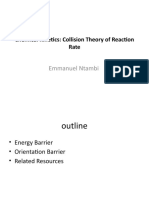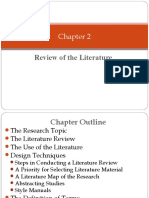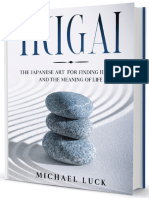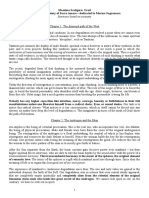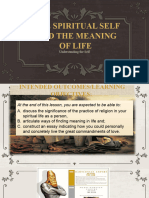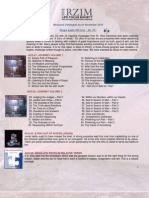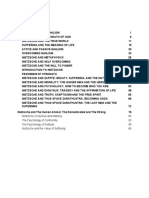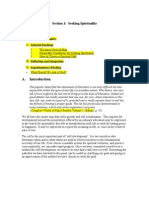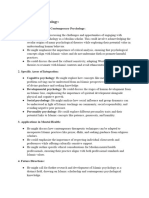IKIGAI
IKIGAI
Uploaded by
Aviyaan SrivastavaCopyright:
Available Formats
IKIGAI
IKIGAI
Uploaded by
Aviyaan SrivastavaCopyright
Available Formats
Share this document
Did you find this document useful?
Is this content inappropriate?
Copyright:
Available Formats
IKIGAI
IKIGAI
Uploaded by
Aviyaan SrivastavaCopyright:
Available Formats
Opening
Good morning, everyone, at first, I would like to thank Professor S. Vishnu for allowing me
to present my views today in front of you all, as well as my worthy companions here for
giving their precious time to me. This presentation is going to be about my favourite novel –
Ikigai. It’s an award winning, International Best seller written by Hector Gracia and Francesc
Miralles. So, before I start let me summarize the topic for a better understanding.
Summery
Ikigai is at the heart of Okinawan culture and is one key to its health and prosperity.
Okinawa is an island to the south of mainland Japan, containing some of the world’s
longest-living humans. On an average, men live up to 84 years and women until 90. Héctor
García and Francesc Miralles, lived among Okinawans and gained a first-hand account of
why these people are healthier, happier and live longer than anywhere else in the world.
Researchers have identified that their diet, simple outdoor lifestyles, and subtropical
climate are three reasons for their longevity. However, it is Ikigai that shapes their lives.
Iki means “to live,” and gai means “reason.” Therefore, Ikigai is a reason to live. Every
individual’s ikigai is personal to them and specific to their lives, values, and beliefs. It
reflects the inner self and creates a mental state in which the individual feels at ease.
Introduction
This book is based on concepts from ancient Japanese technique called- IKIGAI meaning
“Reason of being alive” or in short to find purpose to live for. It provides wisdom from the
people of Okinawa, Japan which is among the blue zones with highest percentage of
centenarians (~25 people above 100 years age/100000 Population).
The Three Lessons, I learnt
These are the three lessons from this novel, I admire the most.
Having some purpose in life is a vital component of longevity and happiness.
If we want to live a long life, follow the advice of some of the oldest people in the
world.
To stay healthy throughout your life, make sure that you are moving enough.
Ready to learn how to live longer, healthier, and happier? Let’s go!
Lesson I – Having some purpose in life
I’m sure most of the people here, must think that they already know the purpose of their
life, at least to some extent. But the reality is these are all assumptions and our believes
with no specific technique or method used to make a check on it.
How to find the purpose of your life?
What are your strengths? Think of what you do better than everyone else.
What does the world need? Imagine something you see that the world lacks.
What are your passions? Picture the things that you could do all day without
stopping.
What can you do to earn a living? You must make money from your craft, so how can
you do that?
These questions are needed to be answered in accord to unveil your Ikigai.
Lesson II – Advice from Okinawan centenarians
One tip from Okinawan centenarians is to worry as little as possible. It helps to slow
down, take your time, and realize that you don’t have to have it all figured out right
away. Anxiety has a myriad of negative health effects.
Focus on enjoying life for what you have, instead of being afraid of what might go
wrong. A great way to do this is to connect with everyone around you, even
strangers. Okinawan old-timers suggest smiling and having an open-heart towards
everybody you meet.
Your friendliness will help you develop many friendships throughout life. Okinawan
elders recommend maintaining those relationships as well. When you become a
grandparent your replacement of worry with friends may also help your
grandchildren visit more often.
Lesson III – Importance of Body Movements
Residents of Okinawa suggest that you don’t always need to play a sport or go
running to be healthy. Longevity and health are more about finding simple,
consistent ways to move more through the day.
Intensity may deter consistency, so Okinawans strive for simplicity in their forms of
exercise. A walk around the neighborhood, day in the garden, or singing karaoke are
just a few simple ways they maintain movement frequently.
Radio Taiso, a Japanese radio show, has helped Okinawans exercise for years. Large
groups of Japanese tune into the station and listen to directions on how to exercise.
In the present day, most watch online or on the television, but the show continues
throughout the day in Japan. With simple exercises, like lifting your arms above your
head and bringing them down again, Radio Taiso is an easy to repeat form of exercise
for the Japanese.
A brief review
Ikigai is an incredible concept that can benefit many people. Whether you feel stuck in your
job, want to live longer, or just desire a deeper level of happiness and meaning, finding your
reason to live will help you. The ikigai summary seems to focus more on how to live a long
life than on ikigai itself, but some research on the topic reveals there are multiple books on
the subject to explore further. I’m excited to dive in and figure out how not to retire and
live happier and healthier!
About authors
Héctor García is a Japanese-Spanish author who has written several books about
Japanese culture, including two worldwide bestsellers, A Geek in Japan and Ikigai. A
former software engineer, Héctor worked at CERN in Switzerland before moving to
Japan. He has now lived in Tokyo for over 16 years.
Francesc Miralles is a Catalan international award-winning author of self-help and
inspirational books. His bestselling novel Love in Lowercase has been translated into
twenty languages. Miralles too lived in Okinawa, Japan.
You might also like
- (Contemporary Philosophies and Theories in Education 3) Duck-Joo Kwak (Auth.) - Education For Self-Transformation - Essay Form As An Educational Practice-Springer Netherlands (2012)Document160 pages(Contemporary Philosophies and Theories in Education 3) Duck-Joo Kwak (Auth.) - Education For Self-Transformation - Essay Form As An Educational Practice-Springer Netherlands (2012)Hary Wahid Pratama100% (1)
- Course Syllabus - Histology LabDocument2 pagesCourse Syllabus - Histology LabFearless Angel100% (1)
- Macromolecules in My Food ActivityDocument3 pagesMacromolecules in My Food Activityapi-323374257No ratings yet
- Sample Learning ModuleDocument14 pagesSample Learning ModuleCryzel MuniNo ratings yet
- Digestive and Endocrine Systems: Chapter TestDocument5 pagesDigestive and Endocrine Systems: Chapter TestJunior SencionNo ratings yet
- Jesus-Centered BibleDocument2 pagesJesus-Centered BibleGroupNo ratings yet
- What Is The Purpose of Our LifeDocument161 pagesWhat Is The Purpose of Our LifeRaquib IqbalNo ratings yet
- Quiz 1 - MacromoleculesDocument3 pagesQuiz 1 - MacromoleculesMariano Valiente Jr.No ratings yet
- SejarahmikroDocument34 pagesSejarahmikroMelati SekarNo ratings yet
- SPECIAL SENSES Anatomy & PhysiologyDocument19 pagesSPECIAL SENSES Anatomy & PhysiologyLUREY JAMES A. VACALARESNo ratings yet
- DIGESTIVE SYSTEM (Handout)Document2 pagesDIGESTIVE SYSTEM (Handout)Bea Isabel Cabal100% (1)
- CHN Transes Midterm FRM TVCDocument18 pagesCHN Transes Midterm FRM TVCmamsh KlangNo ratings yet
- Microbial DiversityDocument6 pagesMicrobial DiversityDev AnandhNo ratings yet
- Quiz 1 - MacromoleculesDocument3 pagesQuiz 1 - MacromoleculesMariano Valiente Jr.No ratings yet
- Introduction To BiologyDocument4 pagesIntroduction To Biologykiran Poudel0% (1)
- Unit C ExamDocument18 pagesUnit C Examapi-199149636No ratings yet
- Cell Division - Key PointsDocument10 pagesCell Division - Key PointssivarajeshwarNo ratings yet
- Muscular System Quiz Study GuideDocument10 pagesMuscular System Quiz Study Guidejbradee100% (2)
- ANATOMY AND PHYSIOLOGY SummaryDocument42 pagesANATOMY AND PHYSIOLOGY SummaryBrythym Mojeca De GuzmanNo ratings yet
- Macromolecules WorksheetDocument10 pagesMacromolecules WorksheetShaira BautistaNo ratings yet
- The CellDocument94 pagesThe CellKorean DramaNo ratings yet
- Blood Anatomy and Physiology ReviewDocument20 pagesBlood Anatomy and Physiology ReviewStacey CamilleNo ratings yet
- Cell Bio Syllabus 2011Document13 pagesCell Bio Syllabus 2011InuyashayahooNo ratings yet
- Sptve Quarter 1 Week 2-FisheryDocument8 pagesSptve Quarter 1 Week 2-FisheryFremelyn DesorNo ratings yet
- Chemical Kinetics: Collision Theory of Reaction Rate: Emmanuel NtambiDocument21 pagesChemical Kinetics: Collision Theory of Reaction Rate: Emmanuel NtambiMoses Umaru MwesigwaNo ratings yet
- Seminar On Primary Health Care AND Primary Health Centre: Presented By: Ms. Neeta JimmichenDocument99 pagesSeminar On Primary Health Care AND Primary Health Centre: Presented By: Ms. Neeta JimmichenneetsjimmichenNo ratings yet
- Cell ConstituentsDocument39 pagesCell ConstituentsMilky YadavNo ratings yet
- Chapter 2Document16 pagesChapter 2kasimNo ratings yet
- Khan Academy Carbohydrates QuestionsDocument3 pagesKhan Academy Carbohydrates QuestionsLoraNo ratings yet
- Microscope PDFDocument26 pagesMicroscope PDFAxestetikriey Hales100% (1)
- Cell CycleDocument12 pagesCell CycleVega, Charles Gabriel G.No ratings yet
- Animal and Plant CellsDocument40 pagesAnimal and Plant Cellsnika zanaNo ratings yet
- Bacteria Vs Viruses and DiseasesDocument38 pagesBacteria Vs Viruses and DiseasesNha HoangNo ratings yet
- Histology SyllabusDocument32 pagesHistology SyllabusAdrianAddieNovioDeJesusNo ratings yet
- Connective TissuesDocument5 pagesConnective Tissuesraphael100% (1)
- Learning Models: Original Material by Dr. Mike Rapatan and Dr. Jade O. AlbertoDocument27 pagesLearning Models: Original Material by Dr. Mike Rapatan and Dr. Jade O. AlbertoJoyae ChavezNo ratings yet
- Carbohydrates Quiz ItemsDocument31 pagesCarbohydrates Quiz Itemswelfredo yuNo ratings yet
- Biology: (Effective Alternative Secondary Education)Document27 pagesBiology: (Effective Alternative Secondary Education)Jarven SaguinNo ratings yet
- Trimester One NotesDocument48 pagesTrimester One NotesHannah RossNo ratings yet
- The Role of Cells and Related DiseasesDocument14 pagesThe Role of Cells and Related DiseasesReizexen GutierrezNo ratings yet
- Physiology Lecture 1Document33 pagesPhysiology Lecture 1Muhammad Khubaib AzeemNo ratings yet
- Chapter 05: Chronic Illness and Older Adults Harding: Lewis's Medical-Surgical Nursing, 11th EditionDocument8 pagesChapter 05: Chronic Illness and Older Adults Harding: Lewis's Medical-Surgical Nursing, 11th EditionTyler TappNo ratings yet
- Grade 9 WW 4Document4 pagesGrade 9 WW 4JOEL MONTERDE100% (1)
- Female Reproductive System (Yuni)Document36 pagesFemale Reproductive System (Yuni)Ayi Abdul BasithNo ratings yet
- 1 Introduction To ZoologyDocument42 pages1 Introduction To ZoologyVaibhav TarkasbandNo ratings yet
- Unit 3 - Dynamic Equilibrium Section 6-Immune System: Biology 2201Document23 pagesUnit 3 - Dynamic Equilibrium Section 6-Immune System: Biology 2201Vivek Gupta100% (2)
- Chemistry of Lipids: Introduction, Classification and FunctionsDocument25 pagesChemistry of Lipids: Introduction, Classification and Functionswajiha khanNo ratings yet
- Organic MoleculesDocument106 pagesOrganic MoleculesAnonymous GUExuPNo ratings yet
- Chapter 22 Upper Respiratory DisorderDocument171 pagesChapter 22 Upper Respiratory DisorderAnnette Aquino GuevarraNo ratings yet
- Why Are We ShallowDocument2 pagesWhy Are We ShallowIrene Mae MutucNo ratings yet
- Cardiovascular System: Anatomy and PhysiologyDocument10 pagesCardiovascular System: Anatomy and PhysiologyDavid PunzalanNo ratings yet
- Chapter 1 The Human Body An OrientationDocument18 pagesChapter 1 The Human Body An OrientationHannah Lee Lumosbog100% (1)
- AnatomyDocument8 pagesAnatomyBhaskar Reddy100% (1)
- Lymphatic SystemDocument70 pagesLymphatic SystemNang Maizana Megat Yahya100% (1)
- The Muscular SystemDocument104 pagesThe Muscular SystemgalaxyduckNo ratings yet
- Microbiology Parasitology Class OrientationDocument14 pagesMicrobiology Parasitology Class OrientationRam Christian VizarraNo ratings yet
- C 2 The Respiratory StructureDocument34 pagesC 2 The Respiratory StructurefadlinlinsaiNo ratings yet
- Anatomy and Physiology Placement Exam 2 Practice With Answers at End!Document9 pagesAnatomy and Physiology Placement Exam 2 Practice With Answers at End!Olalekan OyekunleNo ratings yet
- Concepts and Theories of Aging: Princy Francis M I Yr MSC (N) JmconDocument48 pagesConcepts and Theories of Aging: Princy Francis M I Yr MSC (N) Jmconcj bariasNo ratings yet
- Laboratory Exercise 1 FillableDocument16 pagesLaboratory Exercise 1 FillablePatricia Andrea Alexei FernandezNo ratings yet
- Paget Disease of Bone, A Simple Guide to the Condition, Treatment and Related DiseasesFrom EverandPaget Disease of Bone, A Simple Guide to the Condition, Treatment and Related DiseasesNo ratings yet
- OceanofPDF - Com Ikigai The Japanese Art For Finding Happi - Michael LuckDocument49 pagesOceanofPDF - Com Ikigai The Japanese Art For Finding Happi - Michael Lucklee celNo ratings yet
- IkigaiDocument8 pagesIkigaieltonlow369No ratings yet
- LEO TRAIT - Group 6BDocument6 pagesLEO TRAIT - Group 6BAviyaan SrivastavaNo ratings yet
- MOaB MID TERM 2nd TRI Tata Group-6Document12 pagesMOaB MID TERM 2nd TRI Tata Group-6Aviyaan SrivastavaNo ratings yet
- QT Chandpur CaseDocument13 pagesQT Chandpur CaseAviyaan SrivastavaNo ratings yet
- Earn Goodwill Group 7Document14 pagesEarn Goodwill Group 7Aviyaan SrivastavaNo ratings yet
- Demand and Supply MicroeconomicsDocument8 pagesDemand and Supply MicroeconomicsAviyaan SrivastavaNo ratings yet
- Classic Knitware Case MMDocument6 pagesClassic Knitware Case MMAviyaan SrivastavaNo ratings yet
- KohlerDocument28 pagesKohlerAviyaan SrivastavaNo ratings yet
- Asia Pacific Section-B Group-1B QTDocument11 pagesAsia Pacific Section-B Group-1B QTAviyaan SrivastavaNo ratings yet
- Massimo Scaligero - Sacro Amore ENGDocument8 pagesMassimo Scaligero - Sacro Amore ENGhannor100% (2)
- Control The Life in Yoga WayDocument7 pagesControl The Life in Yoga Wayname100% (1)
- PhiloReviewer IncompDocument5 pagesPhiloReviewer IncompChris MarceloNo ratings yet
- UTS Module 9-11Document22 pagesUTS Module 9-11mikaela thereseNo ratings yet
- Spiritual SelfDocument24 pagesSpiritual SelfBrenda EstuyaNo ratings yet
- Aguirre Cabusas Explore M1 L2Document3 pagesAguirre Cabusas Explore M1 L2Gian AguirreNo ratings yet
- Personality Development - Ubdtce DVGDocument82 pagesPersonality Development - Ubdtce DVGSHEKHARAPPA MALLURNo ratings yet
- Teaching On Spiritual Care. ASSETDocument7 pagesTeaching On Spiritual Care. ASSETjanuar rizqiNo ratings yet
- UTS ReportDocument4 pagesUTS ReportRedMoonLightNo ratings yet
- Carol D. Ryff Burton Singer - Psychological Well-Being Meaning, Measurement, and Implications For Psychotherapy ResearchDocument10 pagesCarol D. Ryff Burton Singer - Psychological Well-Being Meaning, Measurement, and Implications For Psychotherapy Research210810277No ratings yet
- 33786298-Baghavad-Gita Winthrop Sargeant Sunny Series (Good Translation)Document778 pages33786298-Baghavad-Gita Winthrop Sargeant Sunny Series (Good Translation)Chandra100% (1)
- MaterialismDocument3 pagesMaterialismAce AceNo ratings yet
- Yes To Life in Spite of Everything Viktor FranklDocument14 pagesYes To Life in Spite of Everything Viktor FranklCosimo Dell'Orto100% (2)
- CatalogueDocument18 pagesCataloguemadhurajusNo ratings yet
- Cultivating Heart Character: Educating For Life S Most Essential GoalsDocument22 pagesCultivating Heart Character: Educating For Life S Most Essential GoalsJavier AquinoNo ratings yet
- Ted Schmidt - The Purpose of LifeDocument20 pagesTed Schmidt - The Purpose of LifeBauer LászlóNo ratings yet
- Utss Avocado ViewDocument3 pagesUtss Avocado ViewallijahNo ratings yet
- Academy of Ideas - NietzscheDocument92 pagesAcademy of Ideas - NietzscheAditya SinghNo ratings yet
- Human Persons Are Oriented Toward Their Impending DeathDocument40 pagesHuman Persons Are Oriented Toward Their Impending DeathNaddy Retxed100% (1)
- The Clock TowerDocument7 pagesThe Clock TowerR.N. RautNo ratings yet
- Finding Your IkigaiDocument61 pagesFinding Your IkigaiChidambaram Kulasekar100% (3)
- 1 - Seeking SpiritualtiyDocument6 pages1 - Seeking SpiritualtiylaslalaslaNo ratings yet
- Department of Psychology: The Millennial TurnDocument3 pagesDepartment of Psychology: The Millennial TurnHughdelle Wayne AbellaNo ratings yet
- Front of The CardDocument265 pagesFront of The CardSa'eed AbubakarNo ratings yet
- Gray, JW, Does Morality Require GodDocument12 pagesGray, JW, Does Morality Require GodIvaan' AlekqineNo ratings yet
- Twelve Degrees of SilenceDocument5 pagesTwelve Degrees of Silenceblazena_zrnic7728No ratings yet
- Psychology - 10TH ClassDocument31 pagesPsychology - 10TH ClassitsmesainulabithNo ratings yet



